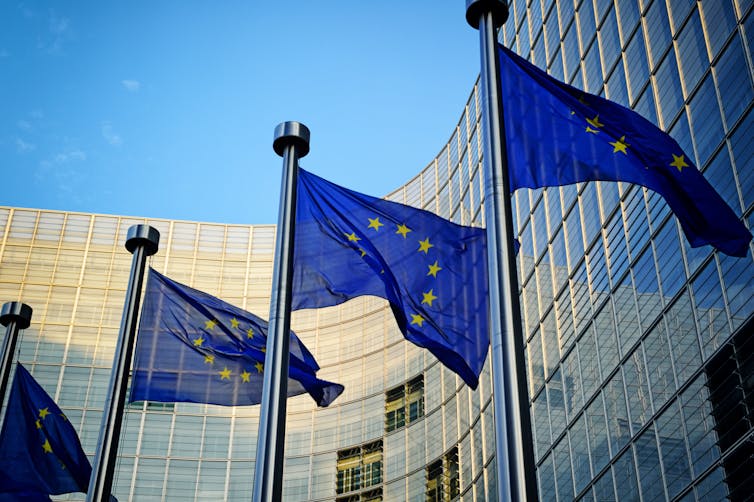Amorn Suriyan / Shutterstock
The UK has simply rejoined the EU’s flagship analysis funding programmes, Horizon Europe and Copernicus. This is nice information for science, the EU and the UK.
The causes are easy: science progresses by way of the person efforts of students and thru worldwide cooperative analysis. The latter course of entails totally different scientific establishments and organisations working in the direction of frequent objectives on quite a lot of totally different tasks.
Science has by no means actually been confined to what we outline in the present day as nationwide borders. The life path of the astronomer Nicolaus Copernicus, supplies an excellent instance of this.
Copernicus was born in Torun, Poland, in 1473. After learning in Krakow, in his residence nation, he moved south, learning within the Italian cities of Rome and Padua. He ended up with a doctorate in canon regulation from the University of Ferrara, additionally in Italy.
Afterwards, Copernicus moved again to Poland to additional his research. Here, he developed a mannequin of the universe with the Sun on the centre, changing the standard mannequin the place the Earth was central. His “Copernican mannequin” helped kick off the scientific revolution.
When the flexibility of researchers to work throughout borders is restricted, science suffers. For this motive, Brexit has broken the UK by way of retaining European students. Some of the proof comes from analysis utilizing information on citations – the variety of occasions a given scientific work has been talked about within the literature by different researchers.
A research led by Ebru Sanliturk on the Max Planck Institute for Demographic Research in Germany, which I participated in, confirmed that, within the three years following Brexit, students who originated within the EU nearly doubled their chance of leaving the UK. On the opposite hand, researchers initially from the UK have change into extra prone to keep of their residence nation or transfer again from the EU to the UK.

The Horizon Europe deal offers UK scientists entry to the world’s largest analysis collaboration programme.
Symbiot / Shutterstock
Why is that this the case? One of the important thing EU funding companies is the European Research Council (ERC). It does one thing uncommon: it funds analysis tasks led by a scientist who’s then free to vary establishment after the grant has been awarded.
ERC information reveals that, since 2007, 98 UK establishments have been awarded 2,397 tasks and a complete of greater than 4 million euros. Put one other method, the UK took 16% of all tasks and complete ERC funding.
The ERC has giant particular person grants: between 1.5 and a pair of.5 million euros per undertaking. It has contributed to elevating the stakes in European science, and being awarded an ERC grant has change into a badge of honour for principal investigators – the scientists who lead analysis tasks.
Moreover, 12 ERC awardees have obtained a Nobel Prize. The UK has benefited too, by attracting principal investigators from 59 totally different nationalities.
International networks
In many scientific areas, Europe has a comparative benefit when it swimming pools assets and minds. Networks of students and establishments make discoveries, push ahead our data and rework scientific findings into purposes.
So EU establishments and students can considerably achieve from interacting with UK-based students and establishments. The UK undoubtedly homes the highest establishments in Europe in lots of fields. If we take the final prime 20 rating of universities from the corporate QS (Quacquarelli Symonds), 4 UK establishments are included, one from Switzerland and none from the EU.
Research infrastructure – the services, tools and instruments used for science – are elementary to enabling discoveries. Some of them are viable solely by investing a big sum of money and assets.
In some circumstances, no single nation in Europe can afford the infrastructure wanted – one instance is the Large Hadron Collider at Cern. The extra members there are, the better it’s to unfold the prices of such tasks.
Another instance is Copernicus, an EU-funded Earth commentary programme utilizing satellites to observe the well being of our planet. It supplies open information, with everyone in a position to entry it in actual time – which is especially helpful in circumstances of environmental emergencies. As a part of its deal to hitch Horizon Europe as an affiliate member, the UK will change into a part of Copernicus.
However, the UK has not negotiated an affiliate membership of ESFRI, the European Strategy Forum on Research Infrastructures. ESFRI tasks, such because the European Social Survey and the Survey of Health, Ageing and Retirement in Europe, present essential scientific insights. These translate into social and financial coverage assessments by evaluating outcomes throughout nations – successfully utilizing Europe as a pure laboratory.
So, there are potential wins and losses to everybody concerned from the actual method the brand new deal has been negotiated between the EU and UK.
Prospects for the long run
Some 17 nations are affiliate members of Horizon Europe, together with science powerhouse Israel (which is a per capita chief in receiving ERC analysis grants), and main gamers resembling Norway, in addition to nations with giant populations like Turkey and Ukraine. Switzerland, alternatively, doesn’t have affiliate member standing with Horizon Europe, however does collaborate with different analysis groups in Europe utilizing different sources of funding.
Whether the UK’s relationship with the EU on science will evolve in the direction of a powerful and secure partnership mannequin much like the one among Israel or Norway, or in the direction of a extra advert hoc one like Switzerland’s, is difficult to foresee.
If science and influence are key, a complementary, sturdy and secure partnership is within the pursuits of each the UK, the EU and different nations with affiliate membership of Horizon Europe. This could make us cautiously optimistic concerning the future for all events.
![]()
Francesco Billari obtained funding from the European Research Council, Horizon Europe, and the Economic and Social Research Council (UK).
